初三下英语知识点仁爱版
仁爱英语九年级下册知识点归纳总结(课时版)

Unit 5 China and the WorldTopic 1 China attracts millions of all over the world.Section A★重难点解析1. China is a great country that has about 5 000 years of history.中国是一个拥有大约五千多年历史的伟大国家。
这是一个由that引导的定语从句,修饰先行词country。
关系代词that在从句中作主语,不能省略,此处也可用which。
如:This is a book that/which tells spoken English。
这是一本讲英语口语的书。
There are some TV programs that/which are good for children.电视上有一些对孩子们有益的节目。
2. There are a great number of rivers in China. 中国有许多河流。
a number of意为“一些”,是固定短语,用作定语。
后接名词或代词的复数形式,作主语时谓语动词用复数。
如:A number of my friends think I should take a holiday.我的一些朋友认为我应该休假。
a great number of = a large number of/large numbers of大量,许多。
如:A large number of/Large numbers of vehicles had to be stopped because of the heavy snow.大量的机动车辆因大雪不得不停驶。
【链接】the number of…意为“……的数量(数目)”,后接复数名词,但谓语动词用单数。
如:The number of students in this school is about 2 500.这所学校的学生大约有2500人。
仁爱英语九年级下 全册 重点短语、重点句型、难点辨析,语法详解
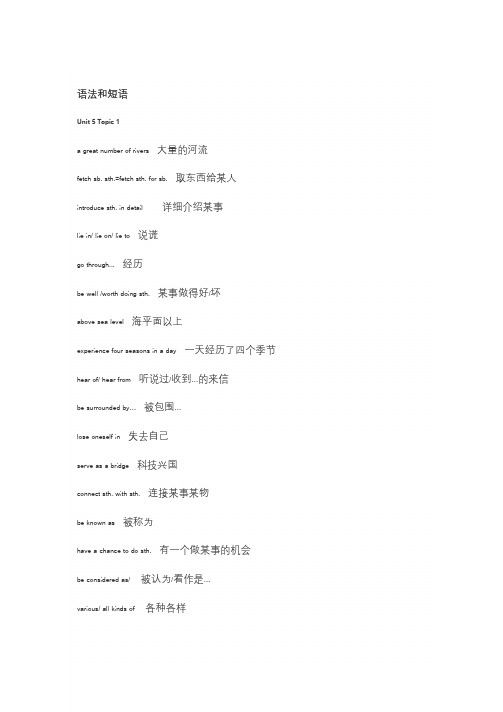
语法和短语Unit 5 Topic 1a great number of rivers 大量的河流fetch sb. sth.=fetch sth. for sb. 取东西给某人introduce sth. in detail 详细介绍某事lie in/ lie on/ lie to 说谎go through... 经历be well /worth doing sth. 某事做得好/坏above sea level 海平面以上experience four seasons in a day 一天经历了四个季节hear of/ hear from 听说过/收到…的来信be surrounded by…被包围…lose oneself in 失去自己serve as a bridge 科技兴国connect sth. with sth. 连接某事某物be known as 被称为have a chance to do sth. 有一个做某事的机会be considered as/ 被认为/看作是…various/ all kinds of 各种各样protect against …保护…be covered with 覆盖Topic 2in the field of education 在教育的领域上receive/get/have a good education 接受/得到一个良好的教育at the age of 55 在55岁search for…搜索in one’s thirties 在某人30岁的时候pass away/die 去世come to an end 结束be proud of/be the pride of/take pride in 以…为豪die of illness 死于疾病in total 总和take an active part in…积极参与…be/become popular with…成为流行…bring down the Qing dynasty 推翻清朝break down from hard work 积劳成疾full of regret 充满遗憾face the danger of…面临的危险wipe out 消灭in my spare/free time 在我的业余时间win a prize 得奖would rather do sth. than do sth./prefer to do sth. rather than do sth. 宁愿做某事而不愿做某事/宁愿做某事而不愿做另一件事fall in love with…爱上…in a tired voice 用疲惫的声音in surprise/surprisingly 在吃惊be ready to help others 乐于助人what’s more 更重要的是pay attention to details 注意细节once upon a time/long long ago 从前/很久很久以前be angry at sth./be angry with sb. 对某事生气。
仁爱英语九年级下册笔记

Topic1 SectionB1.Though I have no time to travel. I still felt very happy.though/ although 不能与but 连用。
但although或though 可以和get或still 连用,以加强转折语气。
如:Though he has a lot of work to do, he often helps these old men.=He has a lot of work to do, but he often helps these old men.Though he was so tired, he still kept working yesterday evening.【拓展】另外,because和so用法也其相同。
如:Because he was ill, he didn’t go to school.= He was ill, so he didn’t go to school.2.My granny told me that most children had a hard life before.have a hard life 过着艰难的生活,也可以用live a hard life。
【链接】live/ have a happy life 过着幸福的生活Live/ have a normal life 过着正常的生活3.Is that so?这个句子是对上文所说的话表示惊讶,相当于Really?如:-----Tom lost the game.------ Is that so? / Really?4.Can you describe it in detail?(1) describe v. 描述它的名词是description。
如:The police asked her to describe the two men.The things sounds a little strange from your description.【拓展】describe sb./sth. For/ to do. 向某人描述某人、某事如:Can you describe our new friend for/ to me?(2) in detail 意思“详细地”,相当于一个副词。
仁爱版九年级下册英语重点知识点梳理
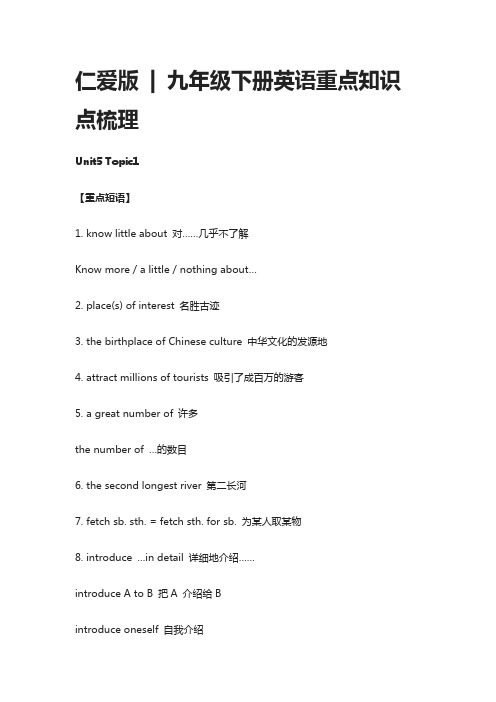
仁爱版| 九年级下册英语重点知识点梳理Unit5 Topic1【重点短语】1. know little about 对……几乎不了解Know more / a little / nothing about…2. place(s) of interest 名胜古迹3. the birthplace of Chinese culture 中华文化的发源地4. attract millions of tourists 吸引了成百万的游客5. a great number of 许多the number of …的数目6. the second longest river 第二长河7. fetch sb. sth. = fetch sth. for sb. 为某人取某物8. introduce …in detail 详细地介绍……introduce A to B 把A 介绍给Bintroduce oneself 自我介绍9. lie in 位于……内10. run / go through…流经/ 途经……11. be well worth doing sth. 很值得做某事12. regard…as…把……看成…..be regarded as …被当作…13. a symbol of imperial power 帝王权利的象征14.carve sth. on the stone 把…刻在石头上15.guard the whole nation 守卫整个民族16.play an important part / role in 在…发挥重要作用17.be made of white marble 由白色的大理石制成18.stretch from …..to…从…. 延伸到….19.be made of packed earth and wood 由成袋的泥土和木头制成be made of stone and brick 由石头和砖块制成20.bring tourists into China 把游客带入中国21.a treasure of Chinese civilization 中华民族的瑰宝22.join…together …. 把…连接在一起23.wear away (wore away, have / has worn away )磨损24.separate …. from …把…从…分开25. be famous for 因…而著名be famous as …be known as …. 作为….而出名26.an important Chinese export 一项很重要的中国出口产品27.sound similar to 听起来和…很相像28.the mild climate 温和的气候29. rich soil 肥沃的土地30.develop unique tea culture 发展独一无二的茶文化【词形转换】1. attract (v.) 吸引---attraction (名词)-- attractive (adj.) 吸引人的2. tour ---tourist (名词) 游客3. introduce (动词)--introduction(名词)4.long ( adj. )--- length ( n. )5. high( adj.) –height ( n.)6. wear ---- wore ---- worn7 enemy -- enemies8. responsible ---- responsibility【重点句型】1. It is / has been ……since ….. 自从…以来已经多久了2. And many of them are famous, such as Mount Song, Mount Huang and Mount Emei.它们当中许多很有名,比如嵩山、恒山和峨眉山。
仁爱英语九下知识点归纳
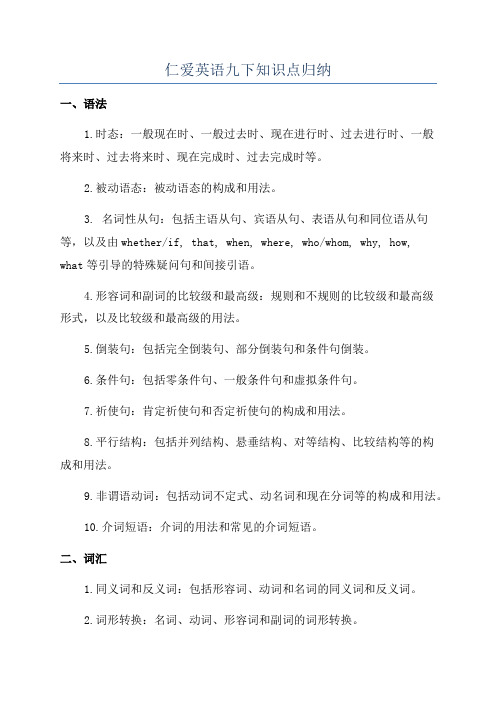
仁爱英语九下知识点归纳一、语法1.时态:一般现在时、一般过去时、现在进行时、过去进行时、一般将来时、过去将来时、现在完成时、过去完成时等。
2.被动语态:被动语态的构成和用法。
3. 名词性从句:包括主语从句、宾语从句、表语从句和同位语从句等,以及由whether/if, that, when, where, who/whom, why, how,what等引导的特殊疑问句和间接引语。
4.形容词和副词的比较级和最高级:规则和不规则的比较级和最高级形式,以及比较级和最高级的用法。
5.倒装句:包括完全倒装句、部分倒装句和条件句倒装。
6.条件句:包括零条件句、一般条件句和虚拟条件句。
7.祈使句:肯定祈使句和否定祈使句的构成和用法。
8.平行结构:包括并列结构、悬垂结构、对等结构、比较结构等的构成和用法。
9.非谓语动词:包括动词不定式、动名词和现在分词等的构成和用法。
10.介词短语:介词的用法和常见的介词短语。
二、词汇1.同义词和反义词:包括形容词、动词和名词的同义词和反义词。
2.词形转换:名词、动词、形容词和副词的词形转换。
3.词组和固定搭配:包括常见的动词短语、介词短语和固定搭配。
4.拓展词汇:通过课文和阅读中的生词来拓展词汇量。
三、阅读理解1.阅读技巧:包括快速阅读、略读和精读等阅读技巧。
2.阅读目的:阅读目的与方法、阅读态度等。
3.推理判断:根据文中的线索进行推理判断。
4.阅读策略:在阅读过程中合理运用策略,如概括大意、寻找关键信息等。
5.阅读材料:包括新闻报道、广告、说明文、记叙文、演讲稿等。
四、写作技巧1.写作结构:包括写作的开头、主体和结尾。
2.写作方法:写作时的选择和组织材料的方法。
3.写作技巧:包括描述、演绎、引用、对比、举例、定义、归纳、递进等写作技巧。
4.书信写作:包括给朋友写信、给老师写信、给亲人写信等。
5.口头表达:包括认为、喜欢、想法、建议和目的等一般句型的用法。
五、其他知识点1.国际音标:了解国际音标的符号和发音。
仁爱版九年级英语下册知识点汇总

仁爱版九年级英语下册知识点汇总Unit 1: Friends- Vocabulary: Words related to friendship and personality traits- Reading: Reading passages about friendship and relationships- Listening: Listening to dialogues and conversations about friends Unit 2: Hobbies- Vocabulary: Words related to hobbies and leisure activities- Grammar: Using the present perfect tense to talk about experiences- Reading: Reading texts about different hobbies and interests- Listening: Listening to people discussing their hobbiesUnit 3: Environment- Vocabulary: Words related to the environment and environmental issues- Grammar: Using modals to express possibility and obligation- Reading: Reading articles about environmental problems and solutions- Listening: Listening to discussions about ways to protect the environmentUnit 4: Health- Vocabulary: Words related to health and healthy lifestyle- Grammar: Using should and shouldn't to give advice- Reading: Reading passages about healthy habits and diseases- Listening: Listening to conversations about health and wellbeingUnit 5: Jobs- Vocabulary: Words related to different professions- Grammar: Using the simple present tense to talk about habitual actions- Reading: Reading texts about various types of jobs- Listening: Listening to interviews and discussions about career choicesUnit 6: Technology- Vocabulary: Words related to technology and electronic devices - Grammar: Using the present continuous tense to talk about future plans- Reading: Reading articles about the impact of technology on society- Listening: Listening to talks and discussions about technological advancementsUnit 7: Travel- Vocabulary: Words related to travel and tourism- Grammar: Using the past simple tense to talk about past events- Reading: Reading passages about different travel destinations and experiences- Listening: Listening to travel stories and conversations about vacationsUnit 8: Dreams- Vocabulary: Words related to dreams and ambitions- Grammar: Using the future tense to talk about future plans and aspirations- Reading: Reading texts about people's dreams and goals- Listening: Listening to people sharing their hopes and dreamsUnit 9: Review- Revision of vocabulary and grammar from previous units- Practicing all language skills: reading, writing, listening, and speaking以上是仁爱版九年级英语下册的知识点汇总。
初三下册英语知识点仁爱版
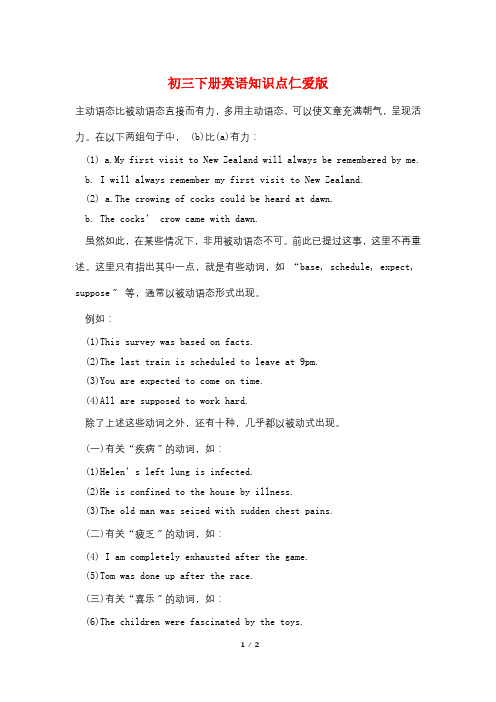
初三下册英语知识点仁爱版主动语态比被动语态直接而有力,多用主动语态,可以使文章充满朝气,呈现活力。
在以下两组句子中, (b)比(a)有力:(1) a.My first visit to New Zealand will always be remembered by me.b. I will always remember my first visit to New Zealand.(2) a.The crowing of cocks could be heard at dawn.b. The cocks’ crow came with dawn.虽然如此,在某些情况下,非用被动语态不可。
前此已提过这事,这里不再重述。
这里只有指出其中一点,就是有些动词,如“base, schedule, expect, suppose〞等,通常以被动语态形式出现。
例如:(1)This survey was based on facts.(2)The last train is scheduled to leave at 9pm.(3)You are expected to come on time.(4)All are supposed to work hard.除了上述这些动词之外,还有十种,几乎都以被动式出现。
(一)有关“疾病〞的动词,如:(1)Helen’s left lung is infected.(2)He is confined to the house by illness.(3)The old man was seized with sudden chest pains.(二)有关“疲乏〞的动词,如:(4) I am completely exhausted after the game.(5)Tom was done up after the race.(三)有关“喜乐〞的动词,如:(6)The children were fascinated by the toys.(7)We were delighted to hear the good news.(8) I am very pleased to see you here.(四)有关“延迟〞或“障碍〞的动词,如:(9)The workers were held up by the heavy rain.(10)The road was blocked by ice.(11)The train was delayed by 30 minutes.(五)有关“惯性动作〞的动词,如:(12)Tom is addicted to smoking.(13)Foreign workers are quite used to hard work.(六)有关“烦恼〞或“焦急〞的动词,如:(14)Who was upset by John?(15)Mother was annoyed to know this.(七)有关“惊奇〞或“震惊〞的动词,如:(16) I was surprised to see him here.(17)All were shocked to hear the bad news.(八)有关“包围〞的动词,如:(18)The troops were surrounded.(19)Troy was besieged.(九)有关“沾污〞或“污化〞的动词,如:(20)Judy’s reputation is tarnished.(21)The water was contaminated with oil.(十)有关“害怕〞或“混乱〞的动词,如:(22)All were frightened out of their wits.(23)He was puzzled about what to do next.要注意的一点是,上面这十类动词有些已渐渐失去了动词力量,转化为惯用语。
新仁爱版九年级下册全册英语单词(带音标很实用)
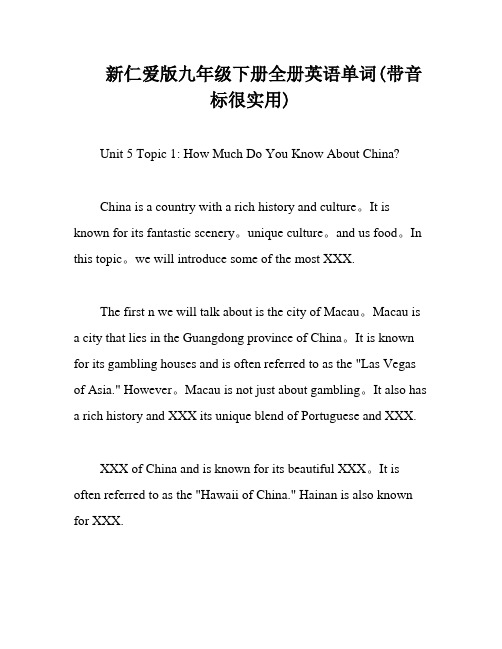
新仁爱版九年级下册全册英语单词(带音标很实用)Unit 5 Topic 1: How Much Do You Know About China?China is a country with a rich history and culture。
It is known for its fantastic scenery。
unique culture。
and us food。
In this topic。
we will introduce some of the most XXX.The first n we will talk about is the city of Macau。
Macau is a city that lies in the Guangdong province of China。
It is known for its gambling houses and is often referred to as the "Las Vegas of Asia." However。
Macau is not just about gambling。
It also has a rich history and XXX its unique blend of Portuguese and XXX.XXX of China and is known for its beautiful XXX。
It is often referred to as the "Hawaii of China." Hainan is also known for XXX.If you are interested in history and culture。
you should visit the city of Xi'an。
Xi'an is known for its Terracotta rs。
- 1、下载文档前请自行甄别文档内容的完整性,平台不提供额外的编辑、内容补充、找答案等附加服务。
- 2、"仅部分预览"的文档,不可在线预览部分如存在完整性等问题,可反馈申请退款(可完整预览的文档不适用该条件!)。
- 3、如文档侵犯您的权益,请联系客服反馈,我们会尽快为您处理(人工客服工作时间:9:00-18:30)。
初三下英语知识点仁爱版
并列连词连接两个或两个以上地位平等的字、词组或分句。
例如:(1) Air and water are indispensable to me.
(2) She likes going out with friends or playing outdoor games.
(3) Most workers have a good income, so they look very happy.
从属连词连接两个或两个以上的分句,形成复杂句中的从属分句。
例如:
(4) He said that he did not want to go .
(5) Many things have happened since I last saw him.
(6) You may come if you want to.
上述连词的用法,看起来不难,但错误也难免。
下面是些好例子:
(1) This book may be used both as a text as well as a reference book.
这里的“as well as”和“both”不能搭配,应该将“as well ”改为“and”,使“both……and……”变成关联连词( correlative conjunction)
(2) He not only speaks Mandarin but also English.
这里的“not only”应该移到“speaks”后面,使这个动词兼顾两个等立宾语:“Mandarin”和“English”。
(3) Although he is fat, but he is very weak.
英语里的“although”和“but”是不见面的,因此这句里的“ but”要去掉,不然“although”就要出来。
(4) Jim is not so strong like you.
这里的“not so”必须和“as”连成一体;介词“like”是不适宜的。
(5) No sooner had we reached our destination, they left.
“No sooner”必须和”than” 配成关联连词,把”than”省掉是不对的,应该补上:No sooner had we reached our destination than they left.
这句子的意思也可透过“as soon as”反映出来:
“As soon as we reached our destination, they left.”
(6) I took a taxi and which took me to the station.
这里的并列连词“and”是多余的,必须去掉。
如果要保留“and ”也可,但是形容词分句里的关系代词“Which”要改成主语“it” ,使整个句子变成并列分句如下:
I took a taxi and it took me to the station.
(7) My friend came up to me and held my hand, said good-bye excitedly.
这里的“and”应该用来连接最后两个谓语才对:
My friend came up to me, held my hand, and said good-bye excitedly.
不然,就要把“said”改成“saying”。
My friend came up to me and held my hand, saying good-bye excitedly.。
